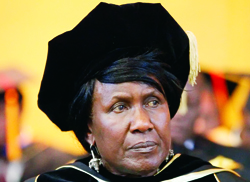
For Dr. Mary Okelo, the nickname ‘Mrs. Barclays’ was well-deserved. Over the years she distinguished herself in the banking world through a series of firsts. She is recognised today as the woman who made it possible for other women in Kenya and in Africa to be granted access to banking facilities, thus enabling them to empower themselves.
Okelo became the first female bank manager in East Africa in 1977 while working at Barclays Bank. At this time, women were not allowed to take loans without the consent of a male figure, usually her husband or father. In the banking industry, women occupied the positions of cleaners, tea girls or cashiers, as they were not allowed to climb up the ranks to top decision-making positions. Okelo was able to enter this male-dominated field through determination and tenacity.
After a short stint at the Ministry of Foreign Affairs where she had nursed ambitions of becoming an ambassador, she applied for a position as a graduate trainee at Barclays Bank and was rejected several times because she was a woman. She was eventually accepted and sent to Barclays Bank in London for a management trainee programme in 1967. While working at Barclays, Okelo saw a need to make banking facilities available and accessible to women. She founded the Barclays Bank Women’s Association in 1976 to mentor young women who aspired to careers in banking and in 1982 founded the Kenya Women’s Finance Trust (KWFT) to grant women access to credit and other financial facilities. KWFT is now the largest microfinance institution in the country.
Okelo continued to pave the way when she left Barclays in 1985 to become the first African representative to Women’s World Banking, an institution that aimed to promote the economic growth of women by giving them access to capital facilities. Her main role was to sensitise women on the importance of financial independence, and to urge African governments to change discriminatory laws against women with regards to access to banking facilities.
Thereafter, she served as the first female senior advisor to the president of the African Development Bank from 1987 to 1990, when she became the vice president of Women’s World Banking. Her influence in the fight against the discrimination of women in banking cannot be ignored today, even as the number of women in top banking positions increases.
In 1992, Okelo left the finance industry and dedicated herself to the education sector, where she proved herself to be an educator worth her salt. She had started what is now known as the Makini Group of Schools in 1978 with her late husband. The school began with eight students in one room of her home. Under her leadership, it has expanded to become one of the most prestigious schools following the 8-4-4 system in Kenya.
